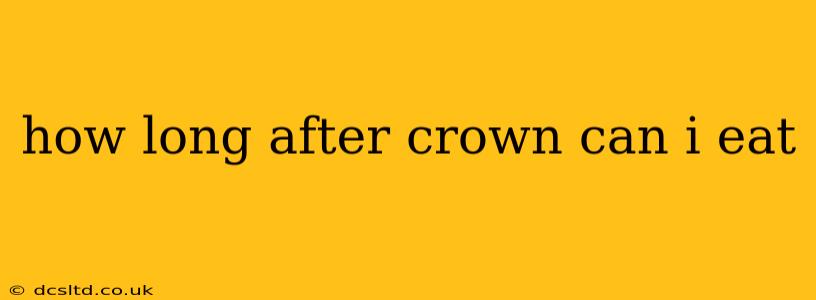Getting a dental crown is a significant step in restoring your smile and oral health. After the procedure, a common question is: "How long after a crown can I eat?" The answer isn't a simple number of hours or days, as it depends on several factors. This comprehensive guide will delve into the details, helping you understand what to expect and how to care for your newly crowned tooth.
What Happens During and After Crown Placement?
Before we dive into eating, let's briefly understand the crown placement process. A dental crown is a cap that fits over a damaged or weakened tooth, protecting it and restoring its shape and function. The procedure involves preparing the tooth (removing some enamel), taking an impression, and temporarily cementing a temporary crown. Later, the permanent crown is fitted and cemented. The temporary crown provides protection while the permanent one is being created in a dental lab.
The time immediately following the procedure is crucial for healing and ensuring the success of the crown placement. Your dentist will provide specific post-operative instructions, which you must follow carefully. This includes information on pain management, oral hygiene, and dietary restrictions.
How Soon Can I Eat After Getting a Temporary Crown?
After receiving your temporary crown, you can typically resume eating relatively soon. However, caution is key. It's best to stick to soft foods for the first 24 hours. This allows the temporary cement to set properly and prevents dislodging the crown. Avoid anything sticky, hard, or chewy that could put excessive pressure on the temporary crown and potentially damage it.
Suitable options include:
- Yogurt
- Applesauce
- Mashed potatoes
- Scrambled eggs
- Soups
Avoid:
- Hard candies
- Nuts
- Popcorn
- Chewy bread
- Tough meats
How Soon Can I Eat After Getting a Permanent Crown?
Once your permanent crown is cemented, you can generally return to your normal diet within a few hours. However, it's advisable to start with softer foods for the first day or two to allow the permanent cement to fully set. This helps to prevent the crown from becoming dislodged. After that period, you should be able to eat most foods without worry.
However, some foods should be approached with caution, even with a permanent crown:
- Extremely hard foods: While your crown is designed to be durable, excessive force from exceptionally hard foods like ice or hard candies could still potentially damage it over time.
- Sticky foods: Very sticky foods can sometimes pull on the crown, potentially leading to problems.
- Foods requiring excessive chewing: Extremely tough or chewy foods can exert undue pressure, potentially causing issues with the crown or the underlying tooth.
What if I Bite Down and Feel Pain or Sensitivity?
If you experience pain, sensitivity, or any other discomfort after eating, contact your dentist immediately. This could indicate a problem with the crown or the underlying tooth. Prompt attention can prevent further complications.
Can I Eat Certain Foods Immediately After Crown Placement?
This depends greatly on whether it is a temporary or permanent crown. As discussed earlier, soft foods are recommended immediately after a temporary crown. After a permanent crown, softer foods are advisable for a day or two, but you can gradually reintroduce your normal diet as tolerated.
What Foods Should I Avoid After Getting a Dental Crown?
Avoid extremely hard foods (ice, hard candies, nuts), excessively sticky foods (caramel, taffy), and tough, chewy foods (steak, jerky) especially during the initial healing period. Prolonged chewing forces can put excessive pressure on the crown and underlying tooth.
How Long Does It Take for a Crown to Fully Set?
While the cement sets relatively quickly, allowing for eating soon after the permanent crown is placed, the complete bonding process can take a few days. Avoid overly exerting the crown during this time.
What Are the Potential Complications if I Eat Too Soon After a Crown?
Eating too soon or consuming unsuitable foods after crown placement can lead to:
- Dislodged crown: This requires a return visit to the dentist for re-cementation.
- Crown damage: Excessive force can chip or crack the crown.
- Tooth damage: Pressure on the underlying tooth could lead to further problems.
- Infection: Improper healing due to food particles trapped under the crown could cause infection.
In conclusion, while you can often eat relatively soon after crown placement, patience and care are crucial. Following your dentist's instructions and gradually reintroducing foods will help ensure the long-term success of your new crown and maintain optimal oral health. Remember, always prioritize your oral health and consult your dentist with any concerns.
